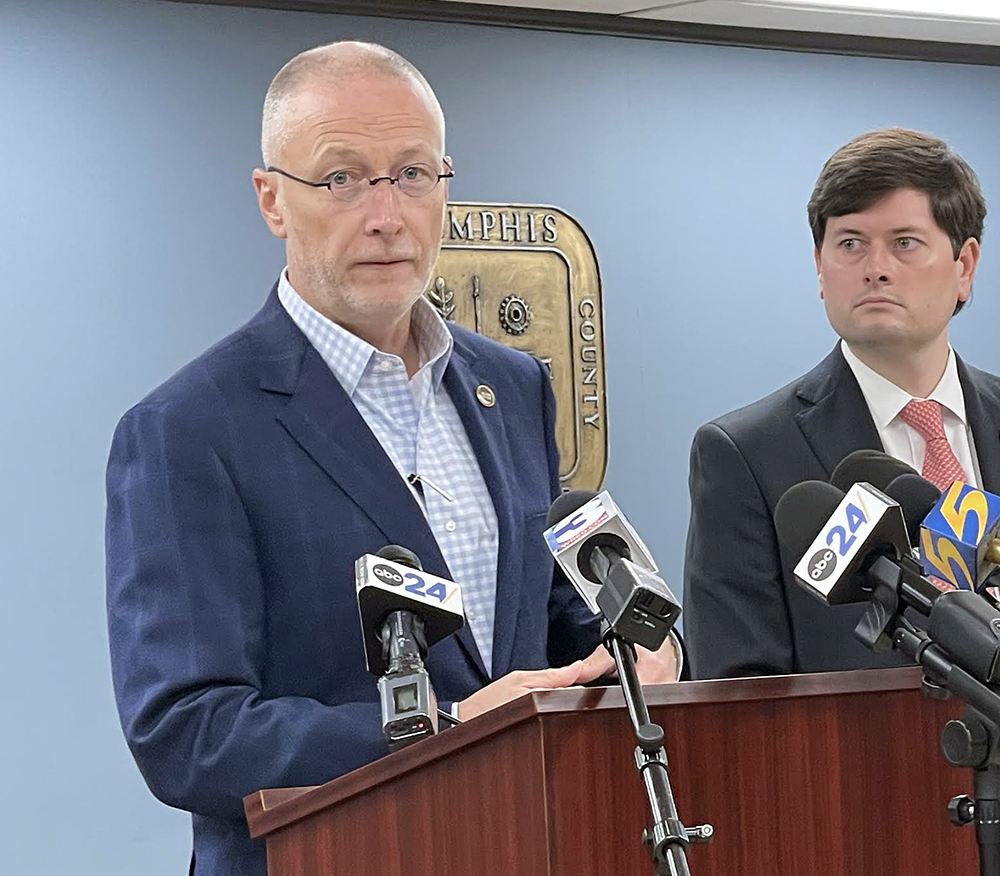District Attorney Steve Mulroy, a Democrat, announced on Monday that he was dropping plans to create a diversion program for previous nonviolent offenders accused of illegal possession of firearms.
But that didn’t stop Republican state Senator Brent Taylor from following through with detailing his previously indicated plan to seek Mulroy’s ouster through legislative means.
“He didn’t pull it because he didn’t think it would have the effect he wanted. He pulled it because I’m on his ass,” Taylor proclaimed bluntly.
There was a significant irony at the heart of Monday’s press conference, which Taylor conducted before a full battery of media at the Jefferson Avenue headquarters of the Memphis Police Association.
And that was that Senator Taylor had characterized the putative diversion program for gun-wielding felons as “the last straw” making his ouster resolution necessary but now insisted his demand for Mulroy’s ouster “was never about the diversion program but … about the DA’s attempt to redefine what crime-and-punishment is in this state.”
Asked by a reporter to detail what some of those other attempts in that regard by Mulroy might have been, Taylor declined, saying, “I’m not going to follow you into that rabbit hole.”
Taylor characterized his ouster effort as being the consequence of numerous conversations he’d had, not only with ordinary citizens and businesspeople but with such legislative eminences as state House Speaker Cameron Sexton and state Senate Speaker/Lt. Governor Randy McNally.
“I believe it’s a conversation, quite frankly, that people have been having in their own homes for a long time,” Taylor said. He described having brought down several legislative colleagues for a look-see, “and every one of them, without fail, have said that Memphis’ crime challenge is much greater than [I] said it was.”
Taylor’s ouster plan, which he vowed to introduce in the next regular session of the General Assembly in January, would require a two-thirds majority in both the state House and the state Senate to succeed. Mulroy, he said, would have full due process by way of defending himself.
Republican state Rep. John Gillespie, who is second only to Senator Taylor, perhaps, in the amount of legislation he has sponsored to impose state authority over law enforcement in Memphis, briefly addressed the press contingent at Taylor’s suggestion, saying the ouster process would be “a drastic measure, but the state has to step in.” He maintained that “until Memphis is safer, I’m going to continue to do everything I can legislatively and through avenues such as this [one] that Senator Taylor has proposed.”
(Though stopping short of endorsing outright Taylor’s ouster proposal, Police Association head Matt Cunningham said he was in general agreement with Senator Taylor’s sentiments on crime control and seemed to suggest that the MPA’s provision of a venue for Taylor on Monday spoke for itself.)
Mulroy would issue a statement later Monday that said of Taylor’s plan, “This is politics, pure and simple. We were No. 1 in the country for violent crime for years before I took office … Rather than disrespecting Shelby County voters by trying to overturn a local election, Sen. Taylor should focus on getting state funding for a local crime lab, raising penalties on ‘Glock switches,’ and letting Shelby County pass sensible gun regulations to stop the flood of guns threatening our safety.”
• After the press conference, Gillespie was asked about his motives in having acquiesced in his GOP colleagues’ carrying out a reapportionment process that many observers, including Jesse Huseth, a Democratic candidate this year for his seat, saw as making District 97 marginally more favorable to Democrats.
Gillespie, who acknowledged that he is considered by some to be a relative political moderate, said he felt comfortable with the district’s demographics. He noted that he has had a Republican primary opponent (the presumably more conservative Christina Oppenhuizen), but, as the year’s politics have developed, he is now more concerned about the threat from the more visibly active Huseth.
